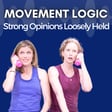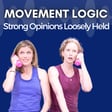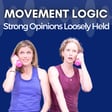
8: A Perimenopause Perspective with Trina Altman, PMA, E_RYT 500
Welcome to Episode 8 of the Movement Logic podcast! In this episode, Laurel is joined by her friend and colleague Trina Altman. Together, Laurel and Trina discuss Trina’s experience with perimenopause. Trina shares her personal story along with tons of resources for women going through this change of life.
- What is perimenopause?
- Doctors have a tendency to minimize women’s suffering
- Brain fog and hot flashes
- Challenges women face when navigating the medical system
- Finding a doctor that spends more time with you AND is evidence-based AND is current on the research
- The Women’s Health Initiative and fear they created around estrogen replacement therapy (ERT) and hormone replacement therapy (HRT).
- Weight gain and perimenopause
- Scope-appropriate advice for movement teachers working with perimenopausal and menopausal students
Guest Bio:
Trina received her training through STOTT Pilates® and is an E-RYT 500. She created Yoga Deconstructed® and Pilates Deconstructed® to show teachers how to take an interdisciplinary approach to foster an embodied understanding of yoga and Pilates in relation to modern movement science.
Trina has presented at Momentum Fest, the International Association of Yoga Therapy Conference, and Kripalu. She also created and taught a Pilates continuing-education course for physical therapists and was part of the faculty for the Brain Longevity conference at UCLA. She was the co-creator of Equinox’s signature program Best Stretch Ever, which utilizes the mobility stick to improve functional range of motion, body awareness, and total body strength.
Trina was a finalist in the Next Pilates Anytime Instructor Competition in 2017. Her work has been published in Yoga Journal, Yoga International, and Pilates Style magazine and her classes have been featured on Yoga International and Yoga Anytime. She is also the author of Yoga Deconstructed®: Movement science principles for teaching, which shows yoga teachers how to integrate modern movement science into their classes and is published by Handspring Publishing.
Reference links:
North American Menopause Society Doctors
If there are no doctors local to you, this website is all telemedicine North American Society Menopause Doctors: https://gennev.com/
Research on HRT and the risk of breast cancer
Dr. Heather Hirsch podcast on breast cancer and HRT
Sign up here for the Movement Logic Newsletter for course discounts and sales!
Watch the video of this conversation at: www.movementlogictutorials.com/podcast
Want more Movement Logic?
- Follow us on IG: @movementlogictutorials
- Get on our mailing list for tons of free content
- Contact us (we're super friendly)
Thanks for listening!


